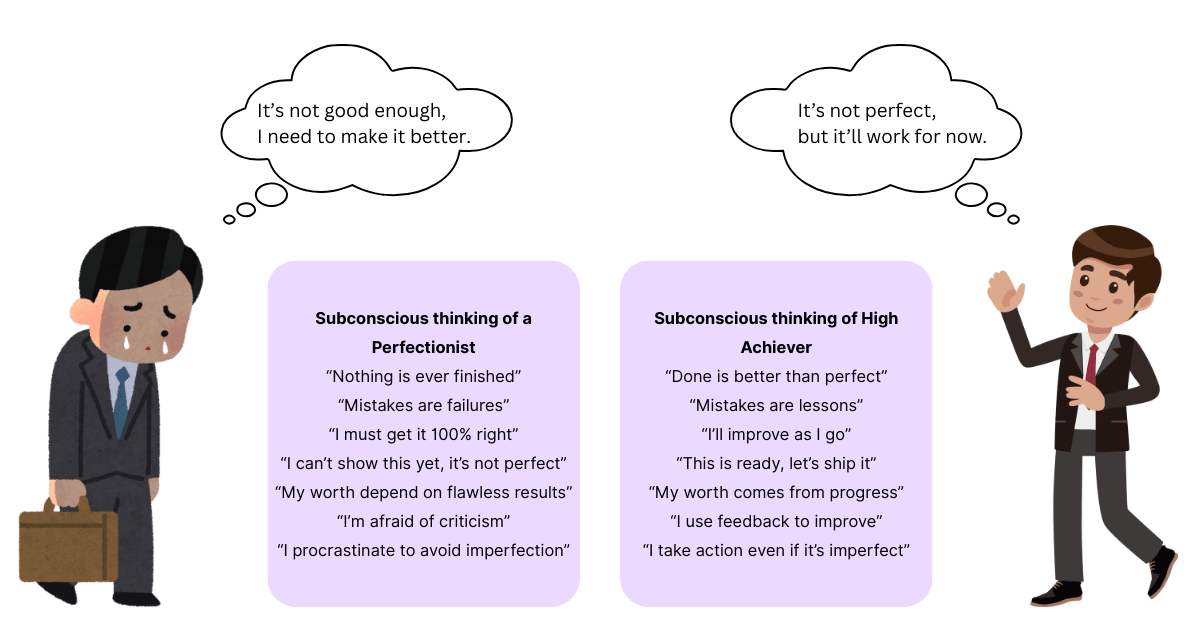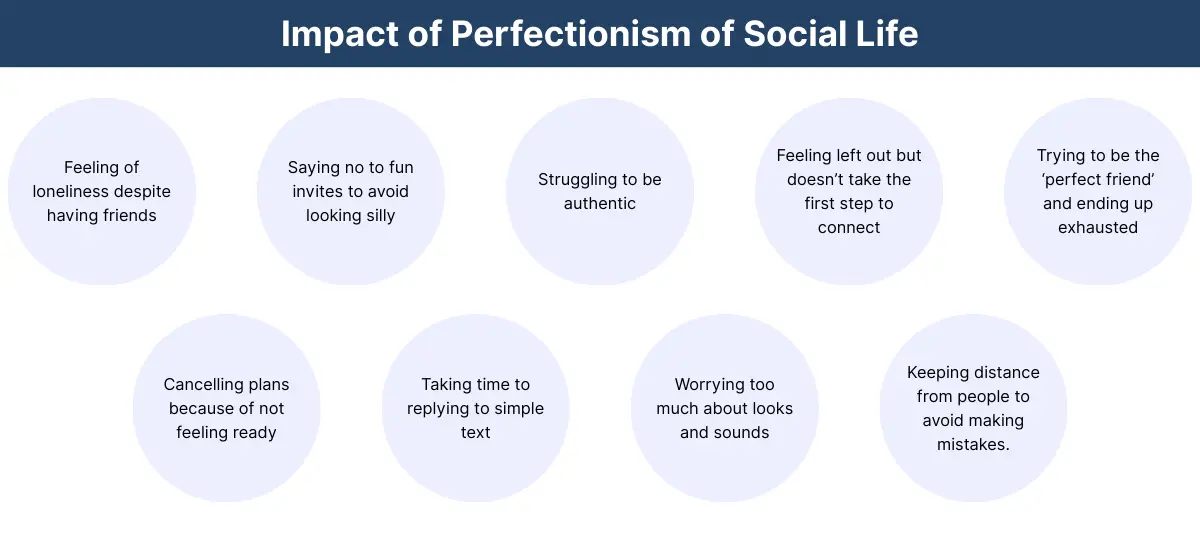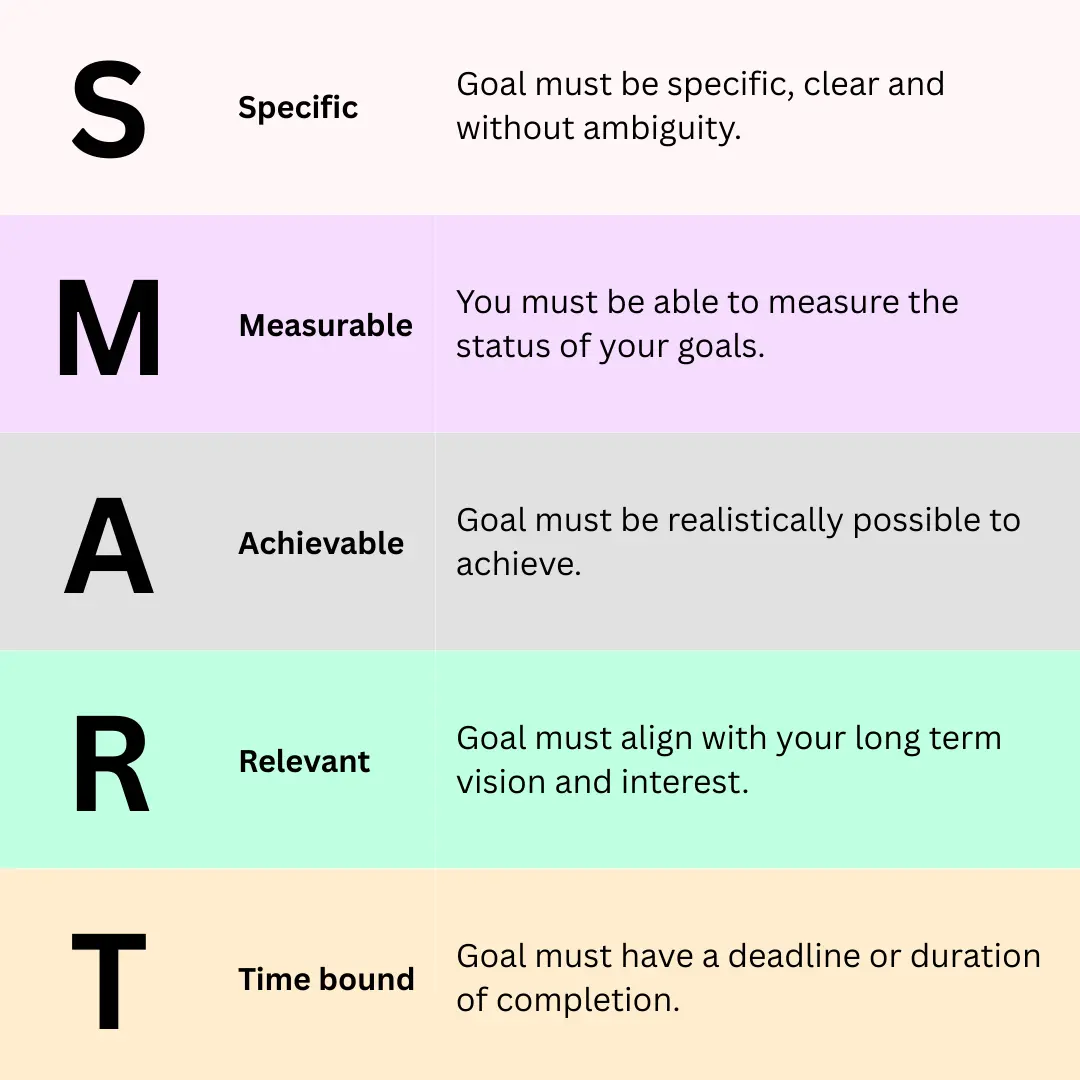Have you ever started a project only to spend hours nitpicking tiny flaws, even before finishing the project?
That’s Perfectionism.
Perfectionism causes a person to ensure every task is perfect, without a single flaw. It includes critical evaluation of one’s own work, finding mistakes, and then abandoning the work because it’s not “perfect”.
A perfectionist often measures their own worth by analysing the flawlessness of their work. If the work is not flawless, then the doer has some issue. The perfectionists often set high goals for themselves that are unrealistic. When those goals are not met, it leads to disappointment, a reduction in self-esteem and self-worth, and eventually total abandonment of the idea.
A perfectionist subconsciously believes:
If it is not perfect, it is not worth working on.
Why do some people chase perfection?
People suffering from perfectionist traits often have a deep-rooted fear of failure and embarrassment. Some of these traits include:
- Fear of Judgement
Many perfectionists are secretly afraid of criticism or rejection. They believe that if they do everything flawlessly, no one will find faults and they won’t have to face failure or embarrassment. - Fear of Uncertainty
Perfectionism gives some people a sense of control over life’s uncertainty. If everything is “perfect,” they feel safe and less vulnerable to surprises. - Self-worth tied to Life achievements
Some people believe their worth depends on how well they do. If they don’t achieve perfect results, they feel like they’re not good enough. - External Pressure & Expectations
Growing up with strict parents, teachers, or competitive environments can make people believe that only excellence is acceptable. This can turn into a lifelong habit of chasing perfection.
The Hidden Downsides of Perfection
There are numerous disadvantages of perfectionism; unfortunately, by the time a person realizes what’s happening to him, it often has already taken a toll on them, particularly on mental health.
Yes, perfectionism can and often does cause mental health problems like Anxiety, OCD, ADHD, Depression and a few others. These mental health issues cause further damage to our overall emotional wellbeing and physical health as well.
We’ll talk about how it happens and what to do about it soon.
Impact of Perfectionism on Productivity
The problem with perfection is that it is not possible to achieve it. Most people think that perfectionists are highly productive because they’re ‘detail-oriented’. Due to this reason, a perfectionist almost never finishes their work, leading to wastage of time and thus productivity.
Perfectionists and high achievers have something in common. They both set lofty goals.
The difference between the two is that high achievers work towards results, not perfection. They’re satisfied with good, working results, even if it has problems.
The perfectionists, on the other hand, don’t complete their work. They keep on improving it until they reach their skill limit and even then they’re not satisfied with the results, so what happens? They abandon it.

Between the two: which one has results to show and which one was most productive?
The answer to both is high achievers, and this is the exact reason why they’re high achievers. They finish their work at the “good enough” stage and start promoting or utilizing the results.
But the perfectionists don’t have anything to use or anything to show, thus making them ultimately unproductive.
If you are not embarrassed by the first version of your product, you’ve launched too late.Reid Hoffman
Stop aiming for perfection. Once you have “good enough” working results, stop and proceed to the next step. You can always improve your work later on, and you always should.
The “paralysis by analysis” Effect
The paralysis by analysis is an overthinking situation in which a person delves so much into detail and choices that it often leads to no or late action.
In perfectionism, the ‘paralysis by analysis’ effect causes prolonged procrastination. Every day you improve, you find more things to improve, and you keep on delaying things for so long that you never take the next step of your work.
Impact of Perfectionism on Social Life
Perfection is the silent destroyer of social life. If you’ve been a perfectionist for too long, you may have very little social life right now, and you probably already feel it. Here are a few of the reasons why perfectionism can destroy your social life.

- Fear of Being Judged
Perfectionists often avoid social situations because they fear saying the wrong thing, looking “imperfect,” or being criticized. This can lead to isolation or missed opportunities to connect with others. - Overly High Standards for Others
Just like they hold themselves to impossible standards, perfectionists can (consciously or unconsciously) expect the same from friends, partners, or colleagues, which may strain relationships. - Difficulty Being Vulnerable
Perfectionists often hide flaws, emotions, or struggles to maintain a “perfect” image. This makes relationships feel distant or surface-level since true connection requires authenticity. - People-Pleasing & Burnout
Some perfectionists go out of their way to keep everyone happy, fearing rejection if they say “no.” This leads to emotional exhaustion and resentment. - Missing Out on Fun
Because they’re always focused on doing things “right” or being productive, perfectionists might struggle to relax and enjoy casual, unstructured time with others. - Risk of Loneliness
Over time, this constant self-pressure can make others feel judged or uncomfortable, which may push people away and leave the perfectionist feeling lonely or misunderstood.
Impact of Perfectionism on Mental Health
- Emotional Exhaustion, Burnout & Chronic Stress
Perfectionists live in a constant state of tension.- They overthink every decision,
- Over-analyze every action, and replay mistakes in their mind long after they happen.
- Burnout: Feeling mentally drained even after small tasks.
- Sleep problems: Racing thoughts at night.
- Physical symptoms: Headaches, stomach issues, muscle tension.
- Perfectionism and Anxiety Disorders
Perfectionism and anxiety go hand in hand.- The constant pressure to “never fail” creates chronic worry.
- Fear of mistakes leads to avoidance, which fuels social anxiety and generalized anxiety disorder (GAD).
- Perfectionism and OCD
In perfectionism OCD (also called “obsessive-compulsive personality traits”):- People feel compelled to redo tasks until they’re “just right.” They obsess over symmetry, order, or correctness.
- This is not always full-blown OCD, but it shares similar patterns: intrusive thoughts + repetitive behaviors.
- ADHD and Perfectionism
It might seem surprising, but ADHD and perfectionism are often linked.- Many people with ADHD develop perfectionism as a coping mechanism for forgetfulness or impulsivity.
- They overcompensate by trying to control every detail, which leads to procrastination (because they wait for the “perfect time” to start).
- This results in a painful cycle of missed deadlines and self-blame.
How Perfectionism Causes Anxiety, OCD & Depression
- Anxiety: The brain stays in overdrive, scanning for mistakes and anticipating problems, which keeps worry levels high.
- OCD-like behaviors: Rechecking, rewriting, redoing tasks can feel compulsive, like you have to do it or something bad will happen.
- Depression: When nothing feels good enough, a sense of hopelessness sets in. This can lead to low mood, loss of motivation, and even clinical depression over time.
How to Overcome Perfectionism?
It’s neither easy, nor impossible to overcome perfectionism. If you suffer from this personality trait, you just have to take very small steps and build from there.
1. Realign your thoughts about tasks and activities
Remember, whatever you do, you don’t have to be perfect. Bill Gates started with a DOS operating system and right now we have Windows 11. Amazon started with an online bookstore, and right now we have a global marketplace. Imagine if they had tried to build Windows 11 or Online Marketplace as soon as they started. They would never have succeeded no matter how hard they tried.
When they built this small imperfect business, that imperfection kept teaching them and their empire grew bigger and bigger.
Follow the same principle. Do the task up until the point it provides useful results and move on to the next step without thinking about the tiny issues. Once you keep moving forward, the issues will start to get resolved automatically as you keep working.
Going out of your comfort zone can help with this process, showing you that growth can often happen when you least expect it.
2. Lower your expectations of yourself and people surrounding you
No one is perfect. No one expects you to be perfect. So why stress about it?
People don’t care how perfect your “work” is. They care only about results. If you keep focusing on perfecting your work, you’ll have nothing to show for your efforts.
Isn’t it better to have something that works with mistakes rather than have nothing?
Imperfect action is better than perfect inaction.Harry S. Truman
3. Have mercy on yourself
This is not a joke. How many times have we heard that we should be kind and merciful to others?
And how often are we kind to our own selves?
Whenever we (perfectionists) commit a mistake, we don’t forgive ourselves. We just start blaming and cursing our own selves, saying Why aren’t we good enough? Would you ever say to your child “you’re not good enough”? Then why say to our own selves?
Our mind is really fragile, and research has consistently proven that it listens to everything we say about ourselves. That’s why the wise have said: “Think positive“, “Be positive“, “Believe in yourself“, etc. This is not magical. It is scientifically proven that our mind is trained on a daily basis through our five senses.
4. Set S.M.A.R.T goals.
The biggest problem with perfectionists is that they set unrealistic goals for themselves. They create the “perfect objective” as a target, but again, it becomes impossible to achieve.
The SMART goal framework was first published by George T. Doran in 1981 and since then, it has garnered huge publicity due to its ease of implementation.

Specific: Write down your goal with extreme detail and specificity, without any ambiguity. Example: “I want to become a writer” is good but “I want to become a book writer of the horror-fiction genre” is more specific.
Measurable: Choose a measurable aspect of your goal that you can track. Example: “1000 words a day”
Achievable: Set a goal that is possible to achieve for you based on your current knowledge, skills and expertise. Example: “I will become a book writer and sell my first book in 3 months” is almost impossible to achieve for a beginner. Instead keep the goal simple “I will write 30000 words in a month” is more doable if you do 1000 words a day.
Relevant: Set a goal which is relevant to your long term vision. If you want to become a book writer, you don’t need to set a goal of learning Graphic Designing to design the cover image of your book.
Time bound: Every goal must have a time element in it. This element could be the completion date, due date and even duration. Think about this very carefully. Do not set a time for a goal that is not possible. Example: “I will write a full book in one week.” is very bad goal-setting.
5. Work with consistency, not intensity
The goal you set is a framework to help you, not stress you. If you miss one day, nothing will happen.
There is nothing wrong with doing more today and less tomorrow. The thing is to do, even if you write just one sentence.
Better to complete 1% of your goal daily than to attempt doing 100% in 100 days.
Good Enough Mindset
The “Good Enough” mindset is one of the most powerful ways to circumvent perfectionism. This mindset is not about being sloppy or settling for mediocrity. It’s about focusing on “progress over perfection” and letting go of the need for flawless results.
Perfectionists often delay starting (or finishing) because they’re afraid of producing anything less than perfect.
- They spend hours rewriting, rechecking, and over-polishing.
- They fear criticism or failure, so they avoid shipping their work until it’s “flawless.”
This often leads to procrastination, burnout, and missed opportunities.
The Good Enough mindset replaces this chronic need of perfectionism and instead allows a person to submit effective, functional and useful results, even when it has mistakes. It prioritizes completion over endless tweaking.
The “Good Enough” mindset is one of the most powerful antidotes to perfectionism. It’s not about being lazy or careless. It’s about focusing on progress over perfection and letting go of the unrealistic need for flawless results.
Think of a newly launched business startup. The first product they launch is under Minimum Viable Product (MVP) label, which means they’re directly telling that this product is working, but not perfectly built yet. This is a real-life example of ‘good enough mindset’.
When applied consistently, this mindset frees you from the paralysis of perfectionism, helps you stay productive, and lets you enjoy the process instead of obsessing over microscopic flaws.
Takeaway: Progress Beats Perfection
Perfectionism feels safe, but it’s a trap. It promises flawless results but often delivers procrastination, frustration, and missed opportunities. The truth is:
- Perfection is an illusion: There will always be something that could be improved.
- Progress matters more than polish: Even imperfect steps move you closer to your goals.
- Consistency wins: Showing up every day, even with small efforts beats waiting for the “perfect” moment.
- Your worth isn’t tied to flawlessness: You are enough, even if your work isn’t perfect.
- Good enough is often great: Finished, functional work creates real-world impact, and that’s what counts.
“Done” has more power than “perfect.” The world rewards people who finish, not those who hide their work waiting for perfection.
If you want to know more about how you can improve your mindset and let go of the things that are harming your mind, check out our guide on mindset.

